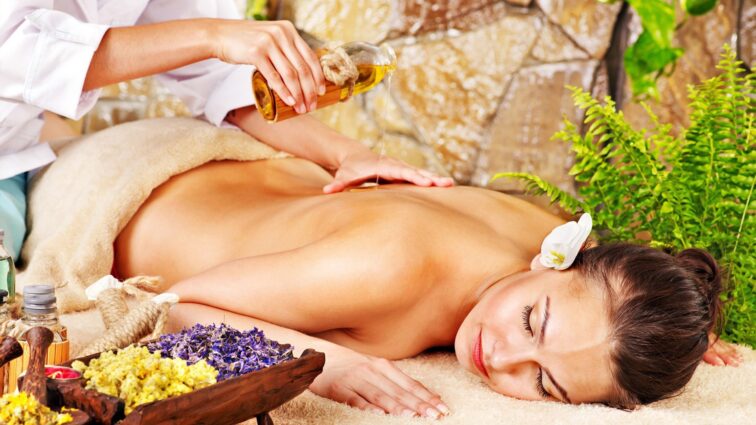HOW TO CHOOSE THE RIGHT MASSAGE OIL?

The main feature of Ayurveda is to consider a person as a whole: the unity of mind, body, and spirit. Health is possible only with a harmonious relationship between the components of the personality and their individual parts. The imbalance between them leads to the emergence of diseases. Therefore, the goal of treatment is to restore the lost balance, i.e. therapy is aimed at the very cause of the disease, not its consequences.
According to Ayurveda, the human body is a sacred temple through which the divine spirit manifests. Disconnection from the energy source makes it difficult for the spirit to pass through the body, which leads to disharmony and the development of various diseases. The purpose of the massage – is to restore the connection with this source and the free passage of spiritual flow through the body and mind. The effect of massage is manifested both on the physical and spiritual levels, contributing to the restoration and revival of all body systems.
Special oils are used during the massage, they are all cold pressed unrefined oils. Their choice depends on a person’s constitution, existing health problems, and the imbalance of the so-called doshas. According to Indian teachings, dosha is the vital energy, the force that drives the psychological and physical functions of a person. Harmony with oneself and the surrounding world is possible only with the balance of subtle energies: Vata, Pitta, Kapha.
HOW TO CHOOSE MASSAGE OIL?
Massage oils can be divided into 2 categories: cold-pressed base oils (eatable fresh cold-pressed) and essential oils.
Base oils are used for all types of massages, but aromatic massage oils help to “play new notes” by combining body massage with aromatherapy.
BASIC MASSAGE OILS

ALMOND OIL FOR MASSAGE
Almond oil is light in nature, has rejuvenating and strengthening properties, and it is warming in effect. It is used to reduce Vata dosha. Almond oil is often used to massage the face and neck. It is suitable for all skin types. The main properties of this oil include strengthening tissues and giving the skin shine and softness. Almond oil is quickly absorbed and has a warming effect.
APRICOT KERNEL OIL
Apricot kernel oil. It has a sweet taste, a slight warming effect, has a pleasant, soft smell. Restores the skin’s natural beauty and radiance, leaving a feeling of velvety. When used internally, it is effective for infectious diseases and constipation.
CASTOR OIL
Castor oil is heavy by nature, has great nutritional value, and strengthens the whole body. It has a warming effect and helps to remove toxins from the human body. It is used to reduce Vata Dosha. It has a thick consistency, a sweet taste, and has a warming effect. It is effective for muscle pain and spasms and stimulates the circulation of lymphatic fluid. When used internally, it has a laxative effect.
LINSEED OIL
Linseed oil. It has a hot nature, moisturizes skin tissues, is effective for constipation, and contains a large amount of essential fatty acids. It can be used both externally and internally.
MUSTARD OIL
Mustard oil warms up the body well and has antiseptic properties, as well as strengthens the skin. Mustard oil is well rubbed into joints affected by osteoarthritis – it helps to restore the normal amplitude of movement in these joints and relieves joint pain. Mustard oil is the strongest warming vegetable oil. Mustard oil is used to regulate excess Kapha (mucus, fluid, fat). It helps to remove excess fluid, bring Kapha back to normal and, accordingly, reduce weight. If Vata needs a calm and relaxing massage, then Kapha needs an intense, invigorating, blood-dispersing massage.
COCONUT OIL
Coconut oil, which is widely used in areas with a hot climate, has the strongest cooling and nourishing properties and is used to treat inflammatory skin diseases, and burns, it is also used to treat hair loss, and used for head massages. Coconut oil reduces the level of Pitta in the body. Coconut oil is great for people of the Pitta constitution at any time of the year. This oil has a mild aroma, does not cause allergies, and is also well absorbed into the skin. Coconut oil is recommended to be used to moisturize dry and even cracked skin. It is especially useful for Pitta-type skin in the summer, as it has the ability to reflect the sun’s rays. Moisturizes the skin, and is effective in inflammatory processes and skin diseases of an infectious nature. Real coconut oil has a soft, sweet, neutral smell.
JOJOBA OIL
Jojoba oil does not leave a greasy shine, but it is well absorbed. This massage oil is suitable for all skin types, but it should be noted that it cannot be used in its pure form. This is due to the fact that it has a very thick consistency, so it must be diluted with other oils. Jojoba oil has the property of smoothing wrinkles, removing inflammation on the skin, and also nourishes and softening it, removing flaking skin.
SESAME OIL
Sesame oil contains many vital elements and vitamins that help slow down the aging process of the skin, as well as give it elasticity and radiance. It has a mild warming effect, nourishes, and deeply moisturizes dry Vata-type skin, protects it from harmful environmental influences, and is rich in minerals, vitamins, macro-, and microelements. The sesame seed oil has a subtle pleasant aroma, so it is used for almost all massage treatments, including even relaxing massage and Ayurvedic treatments. It is hypoallergenic and suitable for all skin types. Also, if you are looking for anti-cellulite massage oil, then sesame oil is best suited.
Sesame oil is the most widely used in Ayurvedic energy massage. It is the best oil in the treatment of diseases associated with Vata Dosha. It has a very beneficial effect on the central and peripheral nervous systems, relieves pain in muscles and joints, improves skin condition, and strengthens hair, being an oil-the basis of hair loss treatment, strengthens bones due to its high calcium content. Sesame oil has a warming effect, so it is used for colds, flu, dry cough, pneumonia, and asthma. Ayurvedic massage with sesame oil has a huge physiological significance. If you have signs of agitated Vata Dosha (insomnia, the unrestrained flow of thoughts, timidity, fears, excessive tension, etc.), a pleasant massage at night with sesame oil will relieve tension and help you fall asleep. To calm the Vata Dosha, you can do a segmental massage with warmed sesame oil: feet, head massage, it’s also good to take a small piece of cotton wool and anoint the navel, ears, and nostrils. Sesame oil will be a salvation for people of the Vata constitution, as it pleasantly warms, soothes, and relaxes. And calmness and warmth are so necessary for restless and frozen Vata.

BALANCING DOSHAS
For Vata-type people, one of the best options would be oil from unroasted sesame seeds (raw cold pressed oil). In addition, ashwagandha oil or Mahanarayana oil is suitable for Vata dosha. A good alternative to sesame oil is ghee, almond oil, mustard, and castor oil.
Pitta-type people need light oils that have a cooling effect: coconut, olive oil, or sunflower oil. Neem oil and Bringraj oil can have a cooling effect on the body. Brahmi oil will be useful for relaxation and calming.
Mustard oil is perfect for regulating excess Kapha (mucus, fluid, fat), it helps to remove excess fluid, bring Kapha back to normal and, accordingly, reduce weight. If Vata needs a calm and relaxing massage, then Kapha needs an intense, invigorating, blood-dispersing massage.
Sesame, corn, mustard oil, or almond oil will help to balance Kapha dosha.
In the arsenal of Ayurveda there are oils that have the properties of Tridosha, that is, they are suitable for balancing all three doshas: Guduchi (soothing and rejuvenating properties), Tulasi (invigorating), Brahmi, and Bringraj to calm the mind.
MASSAGE OILS FOR DIFFERENT SKIN TYPES

Suitable for all skin types: olive oil, almond massage oil, mango oil, jojoba oil, and sesame oil.
Suitable for dry skin: avocado oil, coconut oil, shea butter, and apricot kernel oil, sesame oil.
Suitable for oily skin: sunflower oil, almond oil, grape seed oil, hazelnut oil, and sesame oil.
AROMATIC OILS FOR MASSAGE

In Ayurveda, all people are divided into different types of psycho-physiological constitutions: Vata, Pitta, and Kapha – according to which of these three elements (doshas) naturally prevails in a person. These types of constitutions are determined by pulse diagnostics. Essential oils are also divided into three types (according to which of the doshas they most affect, raising or lowering). Thus, a person with a Vata constitution should not use aroma oils that increase Vata, people with Pitta and Kapha constitutions should avoid oils that increase Pitta or Kapha, respectively. It is also necessary to take into account the temporary imbalances of doshas in the body, which arise for various subjective reasons.
For example, various kinds of inflammation are usually associated with an out-of-balance Pitta. It is also associated with an elevated temperature. Therefore, it is not recommended to use Pitta essential oils in this case. Excess weight, swelling, wet cough, and runny nose are associated with a violation of Kapha dosha, therefore, Kapha oils should be avoided here (they are a minority in nature). Vata disorders are characterized by increased excitability in the mind, insomnia, dizziness, headaches, intestinal pains, and constipation. Therefore, Vata-stimulating oils should be avoided in such cases.
Vata is promoted by: jasmine, geranium, mandarin, myrtle, citronella, St. John’s wort, and Yarrow. Mostly bitter smells.
Pitta is increased by: orange, grapefruit (most citrus fruits), anise, cloves, camphor, cardamom, cinnamon, rosemary, pine, thyme, sage officinalis, eucalyptus, ginger. Sour, pungent, spicy smells.
Kapha is promoted by: vanilla, ylang-ylang, neroli, patchouli, and chamomile. Sweet smells.
With an imbalance of pitta, lavender, lemon grass, lemon balm, peppermint, rose, sandalwood, chamomile, dill, fennel, and tea tree will help to reduce it in the body.
When Vata is unbalanced, it is reduced by: basil, vanilla, vetiver, ylang-ylang, lemon, rose, chamomile, fennel, and sandalwood.
With an imbalance of Kapha, it will be reduced: pine, thyme, sage, eucalyptus, anise, cloves, ginger, camphor, cardamom, cumin, juniper berries, nutmeg, fir.

It is enough to mix just a few drops of essential oil with the base oil to turn the massage into an unforgettable aromatherapy procedure. Essential oils for massage can significantly affect the mood of the client by creating a special atmosphere for any type of massage: from lymphatic drainage to relaxing massage.
What essential oils are used for massage in Pranic Ayurveda®: I have over 115 essential oils and herbal infusions. And each of these essential oils also helps to enhance the effect of massage. All essential oils come from France and are 100% natural without any synthetics or additives.
If you want to learn more about massage at Pranic Ayurveda®, you can always contact us by phone: at +1 214 444 8855 or book online here.
See you at the massage!


